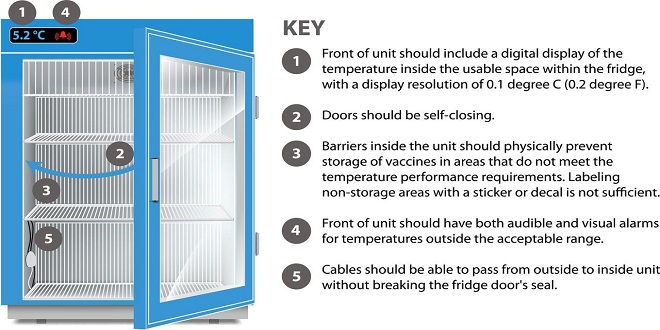The Importance of a Vaccine Fridge in Health Care Settings

In healthcare, vaccines are essential for preventing and controlling the spread of infectious diseases. However, vaccines can only retain their potency if stored at the appropriate temperature. It is where a vaccine fridge comes in, providing a reliable and consistent temperature-controlled environment for the safe storage of vaccines. It is a specialised refrigerator designed to maintain a specific temperature range to store vaccines safely. These fridges have precise temperature controls, alarms, and backup systems to ensure that vaccines are held at the correct temperature. Vaccine fridges are often used in healthcare facilities such as hospitals, clinics, and pharmacies. This article will explore its importance in healthcare settings.
Proper storage of vaccines is essential for maintaining their efficacy and preventing the spread of infectious diseases. It is a critical component of any healthcare facility’s vaccine storage program for several reasons:
Maintaining Temperature Control
Vaccines must be stored within a specific temperature range to maintain their potency. Vaccines exposed to temperatures that are too high or too low may lose their effectiveness. A fridge can provide a consistent and reliable temperature-controlled environment, ensuring vaccines remain at the appropriate temperature, as most of them are equipped with temperature monitoring, alarms, and backup systems that help maintain the integrity of the vaccines.
Preventing Contamination
An ideal temperature can help prevent contamination by providing a closed, controlled environment that makes it less likely to be exposed to harmful pathogens. In addition to maintaining proper temperature control, a vaccine fridge can also help prevent the contamination of vaccines. Vaccines can become contaminated if exposed to bacteria, viruses, or other pathogens during storage or handling. This can happen if vaccines are not stored in a closed, controlled environment and are less likely to be exposed to harmful pathogens.
Compliance with Regulatory Standards
Healthcare facilities must comply with regulatory standards for the storage and handling of vaccines. Compliance with regulatory standards for the storage and handling of vaccines is crucial for ensuring that vaccines remain safe and effective. The standards are set by various organisations, including the World Health Organization (WHO) and the Centers for Disease Control and Prevention (CDC), and may vary by country or region. Fridge for vaccines are designed to meet these standards, providing healthcare providers with a reliable solution for vaccine storage that meets regulatory requirements.
Maintaining Public Health
The necessity of vaccines in public health must be considered. Vaccines are one of the most effective tools for preventing the spread of infectious diseases. They stimulate the body’s immune system to produce antibodies that recognise and fight off specific pathogens. However, vaccines can only be effective if stored and handled correctly.
Exposure to too high or too low temperatures can cause vaccines to lose their potency, rendering them ineffective. The proper storage of vaccines is essential for maintaining public health. Vaccines play a critical role in preventing the spread of infectious diseases, and ensuring that they are stored correctly is vital to preserving their efficacy.
In conclusion, a vaccine fridge is an essential tool for healthcare providers responsible for storing and handling vaccines. It plays a crucial role in preventing the spread of infectious diseases by maintaining temperature control, preventing contamination, complying with regulatory standards, and maintaining public health with the continued importance of vaccines in healthcare, preserving it essential for maintaining the safety and effectiveness of these life-saving medications.




